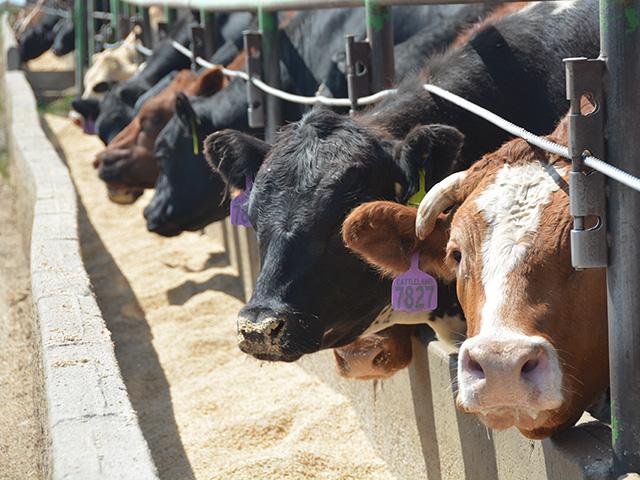Ag Groups Defend EPA in Ninth Circuit
Ag Groups Fight Environmentalists on Attempt to Expand CAFO Permits
LINCOLN, Neb. (DTN) -- Agriculture groups defending the U.S. Environmental Protection Agency from a lawsuit that tries to force the agency to require more concentrated animal feeding operations (CAFOs) to have permits, said in a new court filing the latest legal challenge is simply rehashing legal points already rejected by other appeals courts.
In February 2024, groups led by Food and Water Watch and the Center for Biological Diversity sued the EPA for rejecting a 2017 petition to tighten regulations on CAFOs, asking the U.S. Court of Appeals for the Ninth Circuit to review EPA's rejection of that petition.
In the opening brief, the environmental groups said the agency has the authority to revise its interpretation of the agricultural stormwater exemption, calling the agency's decision to reject the petition wholesale "arbitrary and capricious."
Agriculture groups filed a brief in the Ninth Circuit as intervenors in the lawsuit on June 7, 2024. Those groups include National Pork Producers Council, American Farm Bureau Federation, U.S. Poultry and Egg Association and United Egg Producers.
The environmental groups proposed two ways for the EPA to update the CAFO program.
That includes rewriting the rules to require more CAFOs to obtain permits, even if they don't actually discharge pollutants, and to reinterpret the statutory definition of point-source pollution to prohibit the agricultural-stormwater exemption for CAFOs.
"Petitioners' problem is that two other courts of appeals have rejected EPA's prior attempts to do both, rendering EPA's denial of their requests eminently reasonable," the ag groups said in their brief filed at the end of last week.
"To avoid the same fate, petitioners try to redirect this court away from EPA's actual decision and toward a litany of complaints that boil down to a policy disagreement with Congress and the statute Congress passed. Petitioners' hyperbolic factual recitations and mischaracterizations of record evidence distract from the only question before the court: whether EPA adequately explained why it declined to reopen its existing regulations -- a question on which the agency receives significant deference."
MANURE LAND APPLICATIONS
Although current CAFO regulations limit land applications of manure, the environmental groups said in a court brief the rules "exempt a large swath of land application-related discharges from regulation as 'agricultural stormwater.'"
P[L1] D[0x0] M[300x250] OOP[F] ADUNIT[] T[]
The environmental groups told the court EPA has "consistently failed" to improve CAFO rules.
The agriculture groups said last week the lawsuit mischaracterizes EPA's permitting power and how the system limits pollution from CAFOs.
They said many states impose more requirements on livestock operations than does the federal program.
"As early as 2002, EPA noted that 'only a handful of states rely solely on their state NPDES regulations to address CAFOs," the brief said.
"Rather, most use their NPDES regulations as one part of their CAFO program and supplement these requirements with additional provisions."
The ag groups said all CAFOs "whether permitted or unpermitted" must meet a zero-discharge standard.
"As EPA previously explained, the CWA (Clean Water Act) is very clear that point-source discharges from CAFOs are illegal unless the operator has applied for and obtained an NPDES permit," the brief said. "Thus, 'zero discharge' is the only standard to which EPA can hold unpermitted CAFOs under the CWA."
The ag groups said precipitation runoff from land-application areas is excluded from permitting "only if CAFO farmers apply manure, litter, or process wastewater" using "sound" agricultural practices.
"Petitioners' principal request that EPA compel additional CAFOs to obtain permits through regulatory reform invites EPA to defy both precedent and the statute," the ag groups said in their brief.
"Petitioners' mischaracterizations of the record transparently attempt to propel the court into upending EPA's program, but not only are petitioners' attacks misplaced, they cannot justify an attempt by EPA to exceed its statutory authority by regulating point sources divorced from discharges."
PREVIOUS REGULATIONS
EPA regulations previously required CAFOs to apply for National Pollution Discharge Elimination System, or NPDES, permits if they planned to discharge pollutants.
In 2011, however, the U.S. Court of Appeals for the Fifth Circuit vacated the requirement.
Last summer the EPA announced the launch of a study of pollution generated by CAFOs after rejecting petitions from environmental groups from 2017 and 2022.
EPA said it would form a federal advisory committee to study CAFOs sometime in 2024. That process is expected to last 12 to 18 months.
The 2022 petition was filed by numerous state-level clean water advocacy groups as well as Friends of the Earth, Earthjustice, Humane Society of the United States and others; it asked the EPA to adopt a presumption that large CAFOs using wet manure management systems discharge pollutants.
The 2017 petition asked the EPA to change CAFO regulations to assume several things. That includes CAFOs with certain production-area characteristics do actually discharge; that regulations should assume CAFOs applying manure to land as fertilizer actually discharge; to revise the EPA interpretation of the agricultural stormwater exemption to clarify that it does not include any CAFO-related discharges, among other requests.
Read more on DTN:
"Groups Say CAFO Regulations Needed," https://www.dtnpf.com/…
Todd Neeley can be reached at todd.neeley@dtn.com
Follow him on social platform X @DTNeeley
(c) Copyright 2024 DTN, LLC. All rights reserved.



